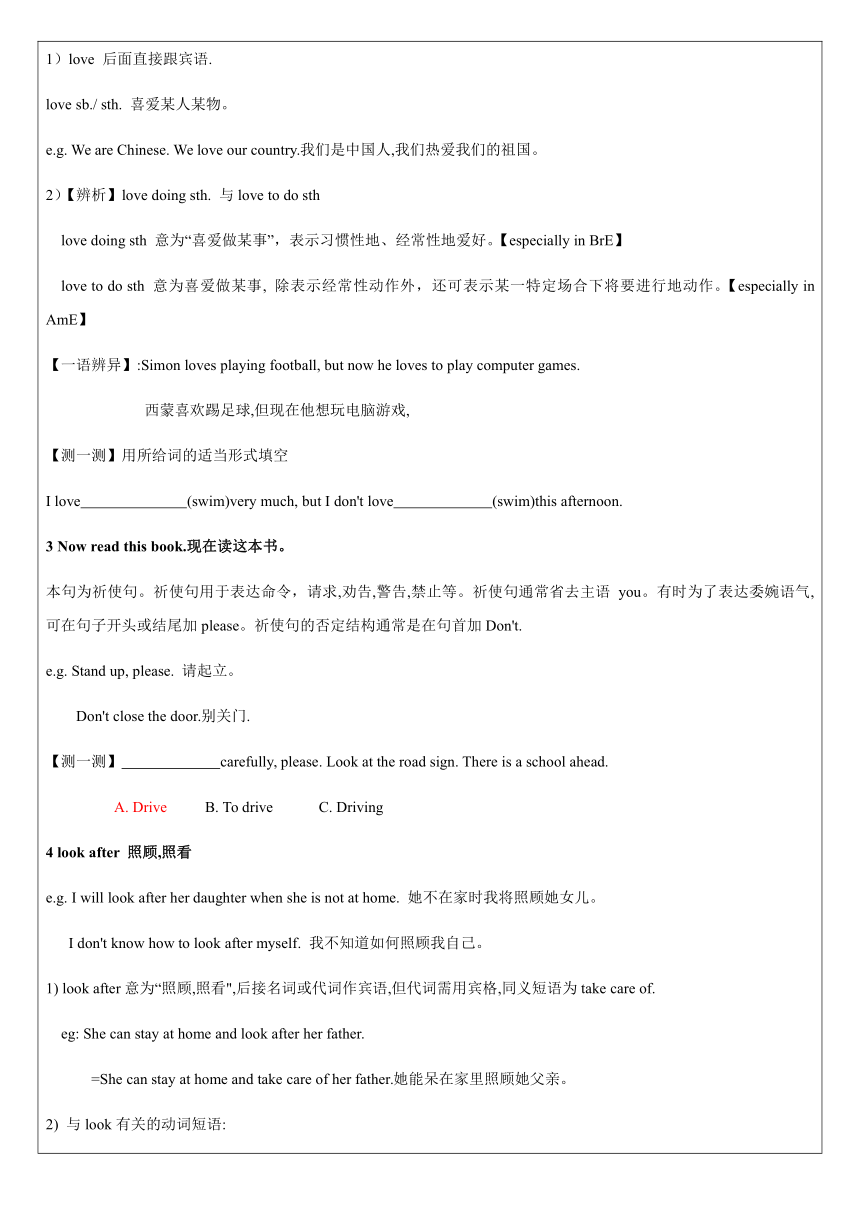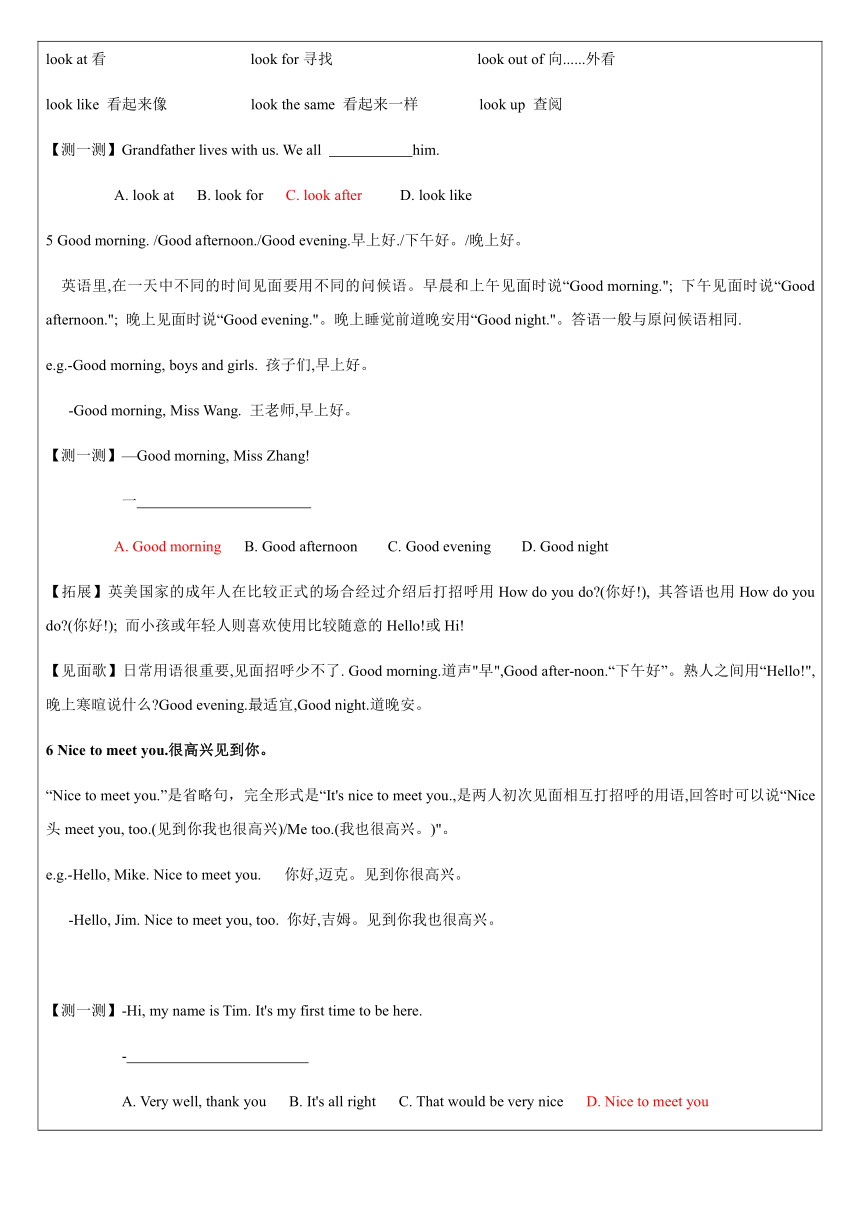Unit 1 This is me Comic strip& welcome to the unit 讲义(含答案) 2024-2025学年牛津译林版七年级英语上册
文档属性
| 名称 | Unit 1 This is me Comic strip& welcome to the unit 讲义(含答案) 2024-2025学年牛津译林版七年级英语上册 |

|
|
| 格式 | docx | ||
| 文件大小 | 24.9KB | ||
| 资源类型 | 教案 | ||
| 版本资源 | 牛津译林版 | ||
| 科目 | 英语 | ||
| 更新时间 | 2024-06-17 13:05:07 | ||
图片预览



文档简介
教 学 内 容 7A Unit 1 Comic strip & Welcome to the unit
教 学 目 标 1. 学会如何介绍自己及如何跟别人打招呼。 2. 重点词汇、短语、句型
重 点 1. 学会如何介绍自己及如何正确地跟别人打招呼。 2. 重点词汇、短语、句型
难 点 如何运用所学知识完成相关练习。
教 学 准 备 知识点、巩固练习、课堂练习、课后作业
教学过程
Step 1 将下列短语翻译成相对应地汉语或英语。 1. my master_______________ 2. meet my friend________________ 3. look after________________ 4. 读这本书__________________ 5. 一只电子狗_______________ 6. 晚安 __________________ 7. What’s your name _____________ 8.交朋友 ________________ Step 2 Language points 1 This is me! 这就是我!(单元标题) 向对方介绍自己常用“I am...",但介绍别人常用“This is...(这是......)",其复数形式是 These are.... 如果介绍距离我们较远的人,则用“That is/That's...(那是......)"。一般不用"She is..."或"He is...". eg: Mum, this is my best friend, Millie.妈妈,这是我最好的朋友,米莉。 This is my father, and that is my mother.这是我的爸爸,那是我的妈妈。 【速记】 介绍用语:作介绍不可怕, I am把己话; this, that 功能全,他人前近后远都表完. 2 love v.爱,喜爱 eg: Do you love reading English newspapers 你喜欢看英语报纸吗 Sometimes he loves to play with little children.有时他喜欢和小孩儿玩。 1)love 后面直接跟宾语. love sb./ sth. 喜爱某人某物。 e.g. We are Chinese. We love our country.我们是中国人,我们热爱我们的祖国。 2)【辨析】love doing sth. 与love to do sth love doing sth 意为“喜爱做某事”,表示习惯性地、经常性地爱好。【especially in BrE】 love to do sth 意为喜爱做某事, 除表示经常性动作外,还可表示某一特定场合下将要进行地动作。【especially in AmE】 【一语辨异】:Simon loves playing football, but now he loves to play computer games. 西蒙喜欢踢足球,但现在他想玩电脑游戏, 【测一测】用所给词的适当形式填空 I love (swim)very much, but I don't love (swim)this afternoon. 3 Now read this book.现在读这本书。 本句为祈使句。祈使句用于表达命令,请求,劝告,警告,禁止等。祈使句通常省去主语 you。有时为了表达委婉语气,可在句子开头或结尾加please。祈使句的否定结构通常是在句首加Don't. e.g. Stand up, please. 请起立。 Don't close the door.别关门. 【测一测】 carefully, please. Look at the road sign. There is a school ahead. A. Drive B. To drive C. Driving 4 look after 照顾,照看 e.g. I will look after her daughter when she is not at home. 她不在家时我将照顾她女儿。 I don't know how to look after myself. 我不知道如何照顾我自己。 1) look after意为“照顾,照看",后接名词或代词作宾语,但代词需用宾格,同义短语为take care of. eg: She can stay at home and look after her father. =She can stay at home and take care of her father.她能呆在家里照顾她父亲。 2) 与look有关的动词短语: look at看 look for寻找 look out of向......外看 look like 看起来像 look the same 看起来一样 look up 查阅 【测一测】Grandfather lives with us. We all him. A. look at B. look for C. look after D. look like 5 Good morning. /Good afternoon./Good evening.早上好./下午好。/晚上好。 英语里,在一天中不同的时间见面要用不同的问候语。早晨和上午见面时说“Good morning."; 下午见面时说“Good afternoon."; 晚上见面时说“Good evening."。晚上睡觉前道晚安用“Good night."。答语一般与原问候语相同. e.g.-Good morning, boys and girls. 孩子们,早上好。 -Good morning, Miss Wang. 王老师,早上好。 【测一测】—Good morning, Miss Zhang! 一 A. Good morning B. Good afternoon C. Good evening D. Good night 【拓展】英美国家的成年人在比较正式的场合经过介绍后打招呼用How do you do (你好!), 其答语也用How do you do (你好!); 而小孩或年轻人则喜欢使用比较随意的Hello!或Hi! 【见面歌】日常用语很重要,见面招呼少不了. Good morning.道声"早",Good after-noon.“下午好”。熟人之间用“Hello!",晚上寒暄说什么 Good evening.最适宜,Good night.道晚安。 6 Nice to meet you.很高兴见到你。 “Nice to meet you.”是省略句,完全形式是“It's nice to meet you.,是两人初次见面相互打招呼的用语,回答时可以说“Nice 头meet you, too.(见到你我也很高兴)/Me too.(我也很高兴。)"。 e.g.-Hello, Mike. Nice to meet you. 你好,迈克。见到你很高兴。 -Hello, Jim. Nice to meet you, too. 你好,吉姆。见到你我也很高兴。 【测一测】-Hi, my name is Tim. It's my first time to be here. - A. Very well, thank you B. It's all right C. That would be very nice D. Nice to meet you 随堂练习 一、选出与句子相对应的答句 1.Are you Millie A. Nice to meet you too. 2.What's your name B. Good afternoon. 3.Nice to meet you. C. Daniel. 4.How are you D. Yes, I am. 5.Good afternoon. E. Fine, thanks. 二、根据句意和汉语提示写出单词, 1.Who is the dog's_ _(主人) 2.Please (阅读)this story again. 3.I'm new here. And I don't know all my_ (同班同学). 4.I want to have an (电子狗).It is very interesting. 5.Let's (见)our new friends now. 三、用所给单词的适当形式填空.。 1.Are you (I) maths teacher 2.Look at the photo! The girl is_ (I). 3.These bikes are my_ (classmate). 4.Kitty and I (be)friends. 5.She waved a friendly (greet) 6. Many students love (listen)to music. 7. Hello, boys and girls. I’m (you)English teacher. 8.I don't know how (look)after my dog. 9.It's very nice (have)many friends at school. 10.I come from Shanghai. My name_ (be)Kitty. 三、单项选择 1.—What's your name 一 A. I'm Li Ming. B. I'm fine. C. Today is sunny. D. I like milk. 2.I have a cat, so I am its A. sister B. master C. parent D. brother 3.—Hello, Li Ning. 一 ,Amy. A. How nice B. How are you C. Nice to meet you D. Hello 4.上午在学校门口遇到刘老师,你应该对刘老师说“ ” A. Goodbye! B. Good morning! C. Good afternoon! D. Good evening! 5.-What does your father do after dinner -He usually newspapers. A. reads B. watches C. looks D. sees 6 Do you know how to look _______ your e-dog A. at B. like C. after D. up 7 Let’s ______________ each other. A. make friend to B. make friends with C. make friends D. make friend 8 He’s very good _____ Maths. So his math is very good. A. on B. at C. in D. for 9 The students often _________ after school. A. play football B. playing football C. play a football D. play the football 10 Tom has _______ basketball. He like it very much. A. / B. a C. the D. an
一 1-5 DCAEB
二 1 master 2 read 3 classmates 4 e-dog 5 meet
三1 my 2 me 3 classmates’ 4 are 5 greeting 6 listening 7 your 8 to look 9 to have 10 is
四 11-15 ABDBA 16-20 CBBAB
教 学 目 标 1. 学会如何介绍自己及如何跟别人打招呼。 2. 重点词汇、短语、句型
重 点 1. 学会如何介绍自己及如何正确地跟别人打招呼。 2. 重点词汇、短语、句型
难 点 如何运用所学知识完成相关练习。
教 学 准 备 知识点、巩固练习、课堂练习、课后作业
教学过程
Step 1 将下列短语翻译成相对应地汉语或英语。 1. my master_______________ 2. meet my friend________________ 3. look after________________ 4. 读这本书__________________ 5. 一只电子狗_______________ 6. 晚安 __________________ 7. What’s your name _____________ 8.交朋友 ________________ Step 2 Language points 1 This is me! 这就是我!(单元标题) 向对方介绍自己常用“I am...",但介绍别人常用“This is...(这是......)",其复数形式是 These are.... 如果介绍距离我们较远的人,则用“That is/That's...(那是......)"。一般不用"She is..."或"He is...". eg: Mum, this is my best friend, Millie.妈妈,这是我最好的朋友,米莉。 This is my father, and that is my mother.这是我的爸爸,那是我的妈妈。 【速记】 介绍用语:作介绍不可怕, I am把己话; this, that 功能全,他人前近后远都表完. 2 love v.爱,喜爱 eg: Do you love reading English newspapers 你喜欢看英语报纸吗 Sometimes he loves to play with little children.有时他喜欢和小孩儿玩。 1)love 后面直接跟宾语. love sb./ sth. 喜爱某人某物。 e.g. We are Chinese. We love our country.我们是中国人,我们热爱我们的祖国。 2)【辨析】love doing sth. 与love to do sth love doing sth 意为“喜爱做某事”,表示习惯性地、经常性地爱好。【especially in BrE】 love to do sth 意为喜爱做某事, 除表示经常性动作外,还可表示某一特定场合下将要进行地动作。【especially in AmE】 【一语辨异】:Simon loves playing football, but now he loves to play computer games. 西蒙喜欢踢足球,但现在他想玩电脑游戏, 【测一测】用所给词的适当形式填空 I love (swim)very much, but I don't love (swim)this afternoon. 3 Now read this book.现在读这本书。 本句为祈使句。祈使句用于表达命令,请求,劝告,警告,禁止等。祈使句通常省去主语 you。有时为了表达委婉语气,可在句子开头或结尾加please。祈使句的否定结构通常是在句首加Don't. e.g. Stand up, please. 请起立。 Don't close the door.别关门. 【测一测】 carefully, please. Look at the road sign. There is a school ahead. A. Drive B. To drive C. Driving 4 look after 照顾,照看 e.g. I will look after her daughter when she is not at home. 她不在家时我将照顾她女儿。 I don't know how to look after myself. 我不知道如何照顾我自己。 1) look after意为“照顾,照看",后接名词或代词作宾语,但代词需用宾格,同义短语为take care of. eg: She can stay at home and look after her father. =She can stay at home and take care of her father.她能呆在家里照顾她父亲。 2) 与look有关的动词短语: look at看 look for寻找 look out of向......外看 look like 看起来像 look the same 看起来一样 look up 查阅 【测一测】Grandfather lives with us. We all him. A. look at B. look for C. look after D. look like 5 Good morning. /Good afternoon./Good evening.早上好./下午好。/晚上好。 英语里,在一天中不同的时间见面要用不同的问候语。早晨和上午见面时说“Good morning."; 下午见面时说“Good afternoon."; 晚上见面时说“Good evening."。晚上睡觉前道晚安用“Good night."。答语一般与原问候语相同. e.g.-Good morning, boys and girls. 孩子们,早上好。 -Good morning, Miss Wang. 王老师,早上好。 【测一测】—Good morning, Miss Zhang! 一 A. Good morning B. Good afternoon C. Good evening D. Good night 【拓展】英美国家的成年人在比较正式的场合经过介绍后打招呼用How do you do (你好!), 其答语也用How do you do (你好!); 而小孩或年轻人则喜欢使用比较随意的Hello!或Hi! 【见面歌】日常用语很重要,见面招呼少不了. Good morning.道声"早",Good after-noon.“下午好”。熟人之间用“Hello!",晚上寒暄说什么 Good evening.最适宜,Good night.道晚安。 6 Nice to meet you.很高兴见到你。 “Nice to meet you.”是省略句,完全形式是“It's nice to meet you.,是两人初次见面相互打招呼的用语,回答时可以说“Nice 头meet you, too.(见到你我也很高兴)/Me too.(我也很高兴。)"。 e.g.-Hello, Mike. Nice to meet you. 你好,迈克。见到你很高兴。 -Hello, Jim. Nice to meet you, too. 你好,吉姆。见到你我也很高兴。 【测一测】-Hi, my name is Tim. It's my first time to be here. - A. Very well, thank you B. It's all right C. That would be very nice D. Nice to meet you 随堂练习 一、选出与句子相对应的答句 1.Are you Millie A. Nice to meet you too. 2.What's your name B. Good afternoon. 3.Nice to meet you. C. Daniel. 4.How are you D. Yes, I am. 5.Good afternoon. E. Fine, thanks. 二、根据句意和汉语提示写出单词, 1.Who is the dog's_ _(主人) 2.Please (阅读)this story again. 3.I'm new here. And I don't know all my_ (同班同学). 4.I want to have an (电子狗).It is very interesting. 5.Let's (见)our new friends now. 三、用所给单词的适当形式填空.。 1.Are you (I) maths teacher 2.Look at the photo! The girl is_ (I). 3.These bikes are my_ (classmate). 4.Kitty and I (be)friends. 5.She waved a friendly (greet) 6. Many students love (listen)to music. 7. Hello, boys and girls. I’m (you)English teacher. 8.I don't know how (look)after my dog. 9.It's very nice (have)many friends at school. 10.I come from Shanghai. My name_ (be)Kitty. 三、单项选择 1.—What's your name 一 A. I'm Li Ming. B. I'm fine. C. Today is sunny. D. I like milk. 2.I have a cat, so I am its A. sister B. master C. parent D. brother 3.—Hello, Li Ning. 一 ,Amy. A. How nice B. How are you C. Nice to meet you D. Hello 4.上午在学校门口遇到刘老师,你应该对刘老师说“ ” A. Goodbye! B. Good morning! C. Good afternoon! D. Good evening! 5.-What does your father do after dinner -He usually newspapers. A. reads B. watches C. looks D. sees 6 Do you know how to look _______ your e-dog A. at B. like C. after D. up 7 Let’s ______________ each other. A. make friend to B. make friends with C. make friends D. make friend 8 He’s very good _____ Maths. So his math is very good. A. on B. at C. in D. for 9 The students often _________ after school. A. play football B. playing football C. play a football D. play the football 10 Tom has _______ basketball. He like it very much. A. / B. a C. the D. an
一 1-5 DCAEB
二 1 master 2 read 3 classmates 4 e-dog 5 meet
三1 my 2 me 3 classmates’ 4 are 5 greeting 6 listening 7 your 8 to look 9 to have 10 is
四 11-15 ABDBA 16-20 CBBAB
同课章节目录
- 预备课程
- Lesson 1 Nice to meet you !
- Lesson 2 A happy family
- Lesson 3 A nice school
- Lesson 4 You look cool !
- Lesson 5 Wonderful things
- Lesson 6 Have nice food
- Lesson 7 Enjoy our days
- Lesson 8 Let's have fun !
- Unit 1 This is me
- Unit 2 Let's play sports
- Unit 3 Welcome to our school
- Unit 4 My day
- Unit 5 Let’s celebrate
- Unit 6 Food and lifestyle
- Unit 7 Shopping
- Unit 8 Fashion
